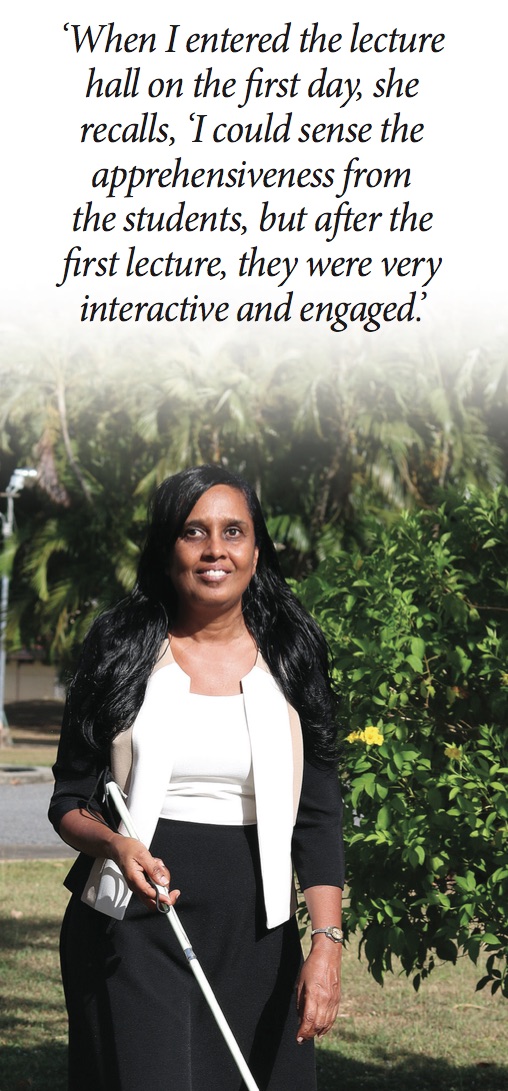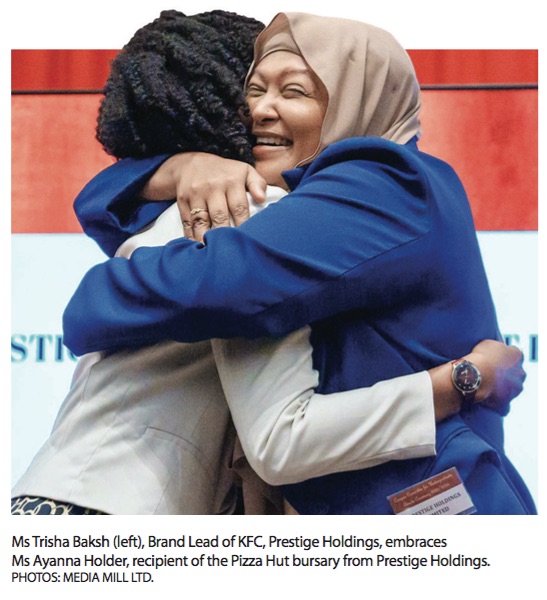UWI strengthens disaster preparedness

Since 2024, The UWI and the Clara Lionel Foundation have been collaborating on a two-year project focusing on early-warning systems for disaster-prone communities. In this three-part series, the three project components will be explored. Part one looks at the community of Roxborough in Tobago, where early-warning flood monitoring equipment has been set up, and vetiver is being planted to reduce flood risks.
For UWI St Augustine Geography Department lecturer Dr Gabrielle Thongs, the disruptive effects of navigating a country vulnerable to persistent flooding are noticeable.
Like many other Trinbagonians, Dr Thongs knows all too well that flooding poses a risk to both lives and livelihoods, with a simple action like commuting to work becoming a deadly hazard if drivers get caught in a thunderstorm in a susceptible area.
In 2024, Dr Thongs, working alongside the Office of Global Partnerships and Sustainable Futures team, successfully sought grant funding from the Clara Lionel Foundation to lead a collaborative pilot project with The UWI. Aimed at improving early warning systems (EWS) in disaster- prone areas, she specifically chose to focus on a community at high risk for flooding, based on the documented frequency and density of past hazardous events.
But looking at the issue from a more strategic perspective, Dr Thongs also wanted to ensure the people in that community would benefit from the project, especially if they were in socially vulnerable positions.
Building on her previous work, Dr Thongs utilised findings from the Caribbean Community Risk Information Tool—a partnership between The UWI and Caribbean Disaster Emergency Management Agency—to select Roxborough. That earlier study had already categorised the community as high-risk due to its social vulnerability and exposure to hazards.
Additionally, with support from the Tobago Emergency Management Agency (TEMA), a comprehensive flood- susceptibility analysis for Trinidad and Tobago that integrates satellite imagery with local data was conducted, and it also identified Roxborough as highly susceptible to flooding.
Its relatively remote location in Tobago also made it an ideal site for implementing real-time monitoring accessible from anywhere.Roxborough emerged as the prime location for the pilot project, representing a critical starting point for a newly enhanced EWS. This initiative is groundbreaking as it integrates four key pillars for the first time: a dedicated EWS mobile app accessible to anyone with a smartphone; rainfall and river gauges for precise data collection; a camera system for long-term visual monitoring; and the introduction of community-led, nature-based flood mitigation solutions.
By blending high-tech data with local nature-based action, the project puts the power of resilience directly into the hands of the community. It is not just an upgrade; it is a complete reimagining of how the Caribbean protects its own.

“Access to real-time information identifying flooded areas and passable routes is essential for effective response. An early-warning camera is now operational on the Roxborough River, with rainfall and river gauges presently under installation,” Dr Thongs established.
“The real-time camera allows all stakeholders involved, including residents, to have continuous monitoring of river conditions without being physically present, which is particularly valuable during heavy rainfall or extreme weather.”
Residents can monitor the river’s status via a live feed available here: https://www.traffictt.com/camera/traffic-camera/north/roxborough/roxborough-river/.
Once the set-up of the river gauge is completed, it will also give TEMA the capability to have precise, real-time measurements of water levels at the Roxborough River, which strengthens the agency’s ability to identify rising flood risks and issue timely alerts via the EWS app to downstream communities.
Equipment for the system was purchased from the US$225,000 grant provided by the Clara Lionel Foundation to the UWI for the project.
Founded by Barbadian global superstar Rihanna, the Clara Lionel Foundation is a nonprofit organisation that supports education, climate resilience, health equity, and emergency response.
All equipment was sourced from established local technology companies to ensure that solutions remain context-appropriate. The Water Resources Authority (WRA) is currently executing the installation of the monitoring equipment, and will assume responsibility for its long-term maintenance. This direct involvement by the WRA ensures that the systems remain operational and continue to provide consistent, reliable data collection for years to come.
For Dr Thongs, the development of a camera and gauge at the Roxborough River is a step in the right direction for Tobago and the wider country to fully embrace the technological capacities available to provide early warning insights.
Dr Thongs added, “Delivering real-time information empowers individuals to make informed decisions during flood events.
“This work represents our commitment as Caribbean academics to move beyond theory. We are dedicated to building a more robust informational framework that empowers citizens and disaster management agencies alike to make faster, more effective decisions when every second counts.”
But the technological equipment is not the only method being used to reduce Roxborough’s flooding risk. Dr Thongs continued by saying “As a higher education institution, The University of the West Indies has a responsibility not only to strengthen resilience across the Caribbean, but also to transfer this knowledge to the next generation of practitioners and decision-makers. Accordingly, a core component of this project was the active involvement of students in the installation of the nature-based solution at the Roxborough River site, ensuring that theoretical learning was reinforced through practical, hands-on experience.”

Dr Thongs explained, “This nature-based approach not only enhances disaster mitigation but also offers additional benefits. For example, we are exploring the integration of this site into eco-tourism tours in Tobago. “This dual approach allows the intervention to provide both environmental protection and direct economic stimulation for the community.”
On November 25, 2025, undergraduate and postgraduate students of The UWI participated in a workshop at Roxborough, where they learned about the benefits of vetiver through a presentation by Vetiver TT. The workshop also included a site visit to the Roxborough River, during which students had the opportunity to actively participate in the planting of vetiver at the Roxborough site, gaining practical, hands-on experience with the nature-based solution.
Dr Thongs explained that being on-site enabled students to better understand the practical application of flood mitigation techniques. Vetiver TT led the implementation of this component of the project through the installation of vetiver grass along the banks of the Roxborough River.
Vetiver was selected for its effectiveness as a nature- based solution, providing a sustainable, low-cost, and practical approach to flood mitigation. Vetiver mitigates floods by forming dense barriers that slow water flow, trap sediment, and stabilise soil with its deep, strong roots, effectively reducing runoff and preventing erosion.
Dr Thongs selected vetiver for the project as it met the key criteria of being easily replicated in communities facing similar flood risks and of actively engaging local labour, ensuring knowledge transfer and fostering local ownership of the solutions.
For Dr Thongs, this practical application was the perfect antidote to traditional classroom learning. She explained that “Too often in the Caribbean, we focus on teaching students about problems.”
She reflected, “This project allowed students to take ownership of a real, live case study. They weren’t just observing from the sidelines; they were on the ground, actively contributing to the solutions that will protect this community. They became architects of the solution.”
One of the students who participated in the Tobago site visit was Zoe Webb, a final year student studying a double major in Geography, and Environmental and Natural Resources Management.
Webb described the opportunity of seeing the vetiver system and helping to plant it as a moment she saw the practical application of green infrastructure, something she learns about from textbooks and journal articles.
Webb added, “The vetiver grass is not a new crop to me, but during the trip, I learned more about the extent of its properties, characteristics, and applicability to nature-based solutions for risk management.
“Learning beyond the lecture theatre within this three- tiered community project allowed not only myself but also the surrounding community, through their long-term participation, to increase their disaster risk awareness.”
While this initiative represents a major breakthrough, executing such a complex, mammoth task was only possible through the deep collaboration of multiple agencies and a dedicated project team. The success of this pilot rests on the efforts of Dale James, Lisa Hamilton-Braithwaite, and Kevin Manning from the Office of Global Partnerships and Sustainable Futures, working alongside partners at Vetiver TT, TEMA, the WRA, Ultimate Solutions Ltd and Ms Sherise Gomez.
More than just a technical milestone, their work has secured a small but significant step toward regional safety, offering a truly Caribbean-led, designed, and implemented prototype for disaster resilience.